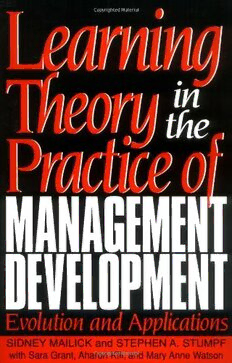Table Of ContentLearning Theory
in the Practice of
Management Development
Learning Theory
in the Practice of
Management Development
EVOLUTION AND APPLICATIONS
Sidney Mailick and Stephen A. Stumpf
with Sara Grant, Aharon Kfir, and Mary Anne Watson
QUORUMBOOKS
Westport,Connecticut • London
LibraryofCongressCataloging-in-PublicationData
Learningtheoryinthepracticeofmanagementdevelopment:evolution
andapplications/SidneyMailick,StephenA.Stumpf,withSara
Grant...[etal.].
p. cm.
Includesbibliographicalreferencesandindex.
ISBN1–56720–052–4(alk.paper)
1. Executives—Trainingof. 2. Management—Studyandteaching.
3. Learning. I. Mailick,Sidney,1923– . II. Stumpf,StephenA.
HD30.4.L4 1998
658.4'07124—dc21 97–32993
BritishLibraryCataloguinginPublicationDataisavailable.
Copyright(cid:2)1998bySidneyMailick,StephenA.Stumpf,SaraGrant,
AharonKfir,andMaryAnneWatson
Allrightsreserved.Noportionofthisbookmaybe
reproduced,byanyprocessortechnique,withoutthe
expresswrittenconsentofthepublisher.
LibraryofCongressCatalogCardNumber:97–32993
ISBN:1–56720–052–4
Firstpublishedin1998
QuorumBooks,88PostRoadWest,Westport,CT06881
AnimprintofGreenwoodPublishingGroup,Inc.
PrintedintheUnitedStatesofAmerica
Thepaperusedinthisbookcomplieswiththe
PermanentPaperStandardissuedbytheNational
InformationStandardsOrganization(Z39.48–1984).
10987654321
Contents
Preface vii
1. The Nature and Objectives of Management Development 1
2. The Theory of Management Development: The Matter of
Learning 11
3. Passive and Experiential Learning 21
4. Management Development Methods: Traditional and
Experiential 29
5. Contributions of Behavioral Science to Management
Development 45
6. A Natural Experiential Approach 55
7. Evaluation of the Israel Modular Preceptor Method after Ten
Years 99
8. Experiential Learning in Management Education 105
9. Management Development in MBA Programs of the Future 117
10. Development Opportunities for the New Manager 131
11. Developing Leaders to Manage Organizational Transitions 139
12. The Future of Management Development 147
Bibliography 151
Index 171
Preface
In 1947, Professor Leonard D. White of the University of Chicago sug-
gested to agency heads of the federal government in the greater Chicago
area that they should establish a seminar to discuss common problems and
issues. The agency heads rejected this proposal. They said that they had
instituted all sorts of training programs in their agencies for different levels
of employees and they were even conducting supervisory training programs
for up to first-line managers. But the idea of the heads of agencies them-
selves participating in what could be called a training program was not
needed or wanted.
However,agreatrevolutionhasoccurredinthepastfiftyyears,andtoday
management training programs and management development activities,
even for the highest-level executives, are continuously conducted. It is rare
to find a large or middle-sized organization which does not provide its sen-
ior executives with management development programs.
There are a vast number of potential participants in management devel-
opment programs. There are over 2.5 million executives and senior man-
agers in the United States. Whether their role is one of control or support,
their performance has great consequences for the fortunes of their organi-
zations. Their activities, more than the activities of any other group, are
characterized by riskier and more significant decision making and by more
crucial boundary spanning activities. Even if the organization’s pattern de-
mandsworkinginteams,amanagercanhavegreatinfluenceonthebehavior
of all who work in the organization.
Since World War II, organizations have made a steadily increasing effort
to improve the competence of their managers and ensure that a pool of
managerial talent will be available when needed. The impetus for this trend
viii Preface
came with the recognition that people are an organization’s ‘‘most signifi-
cant resource’’; that managing people effectively can provide a great differ-
ential between organizations; and that improved leadership is attainable
through planned management training and development. Therefore, our
study is of considerable significance.
What exactly is management development—the focus of our efforts? It is
an organized effort to develop, increase, and improve managerial compe-
tencies, either in an individual manager or in a group of managers. Some-
timestheobjectiveistomotivateandtohelpmanagersconformtoproposed
neworganizationalpolicies.Insomecasestherearemultipleobjectives.One
focus is directed toward increasing managerial competence in a specific
venue and toward motivation for lifelong learning.
While formal programs for recruiting, developing, improving, and maxi-
mizing the use of managerial resources are now major concerns, it was not
always so. In the past, even large organizations depended on identifying
potential managers from among supervisors who came from the blue-collar
and technical ranks, and from among law, finance, and engineering profes-
sionals. Those selected were expected to learn management on the job by
observing the performance of others.
Today many approaches are employed to improve the competence of
managers. These include recruiting managers who have demonstrated com-
petence, providing incentives for outstanding performance, assigning man-
agers so as to make best use of their capabilities, restructuring managerial
roles, and increasing the competence of individual managers through train-
ing and education. This latter activity, management development, includes
rotating assignments, evaluating performance and providing feedback, con-
tract performance (e.g., management by objectives), on-the-job training,
mentoring, and formal training and education in management roles and
tasks. In this book we focus on the training and development parts of the
process.
While the proximate objective of management development is to change
the work behavior of managers, the long-term objective is to motivate and
help managers to learn from their experiences in a continuous, independent
learning process. This book deals with the theory and practice of learning
approaches to achieve both objectives.
The book is divided into three main sections:
1. A discussion of the nature and objectives of managementdevelopment,learning
theoryonwhichitisbased,traditional,passivelearningapproaches,andsynthetic
experientialapproaches.
2. Natural,work-basedexperientiallearningapproaches.
3. Anumberofanalyseswhichexaminevariousaspectsofmanagementdevelopment
theoryand practice.
Preface ix
We hope that this book will be useful to students and teachers of organ-
izationaltheoryandmanagementscience,tomanagersinpublicandprivate
service, to managers of human resources programs and to personnel admin-
istrationspecialists,tolearningtheorists,andtostudentsofeducationtheory
and practice.
WethankWilliamPincus,JohnDonohue,KatherineWoodring,andBah-
man Gfaffarsamar for their great aid in the preparation of this book, and we
also express our gratitude to our editor, Alan Sturmer, for helping to shape
the book into its final form. Finally, we acknowledge our great debt to the
late Solomon Hoberman, whose profound insights informed our under-
standings and from whom we developed our basic theories in management
development.

